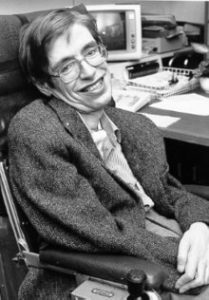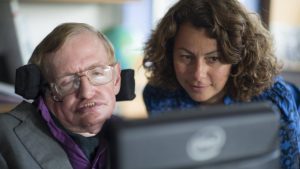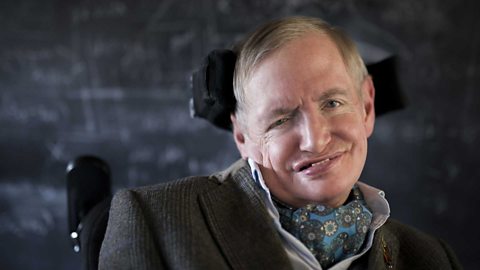World renown physicist, Stephen William Hawking, has passed at the age of 76.
Join us as we comb through the pages of Hawking’s life achievements, inspirations, and scientific work during his time here on Earth.
“Intelligence is the ability to adapt to change.”
Biography of Stephen Hawking
Stephen Hawking was known for many things: a well-renowned physicist, a professor, an author, a cosmologist, the person that discovered the study of black holes. While Stephen Hawking may have passed, his legacy and work still live on.

Born in England, 1942, Dr. Stephen Hawking made a name for himself, first attending Oxford University for his undergrad and then the University of Cambridge for his Ph.D. in cosmology. He is best known for his discovery that black holes emit radiation which can be detected by special instrumentation. Unfortunately, he was diagnosed with Amyotrophic Lateral Sclerosis (ALS), commonly referred to in the U.S. as Lou Gehrig’s disease.
Despite his disability and his predicted short lifespan, the theoretical physicist was still able to maintain his intelligence and make a meaningful impact in the world today. As a professor at the University of Cambridge, his alma mater, he heavily relied on engineering technology for him to communicate and share his ideas with his students, colleagues, friends, family, and the public.
Hawking’s Impact on Technology
Dr. Hawking used assistive technology to compensate for mobility and speech difficulties. Not only did he use a thumb switch and a blink-switch attached to his glasses to control his computer, but he was also able to communicate to audiences by squeezing his cheek muscles and blinking. As a result, an infra-red switch was instigated and he was able to scan and select characters on a screen that composed speeches, functioned emails, surfed the Internet, and “spoke” through a synthesizer.

This was particularly imperative since Dr. Hawking was always trying to share his views with the world. In fact, the woman who saved Stephen Hawking’s his distinct voice was Lama Nachman, director of the anticipatory computing lab at Intel Corporation. They met in 2011 and her primary task was to upgrade the computer system that helped Hawking communicate his thoughts. In 1985, Stephen Hawking lost his voice after a tracheotomy, but with the help of the adopted computer system developed by Lama Nachman and her team, he was able to maintain and develop his voice.
Technology like the computer system helped Hawking overcome ALS, but it was evident that the assistive technology needed an upgrade by 2011. First, Nachman and her support team were asked to improve the speed of communication. However, the hardware that advocated Hawking’s voice was so old that it could have failed at any second. As new computerized voices became available at the time, Hawking was adamant about keeping the one he had. He felt as if the voice he obtained in 1986 was his own and he loved it so much he had it copyrighted.
A Lasting Inspiration
When it comes to assistive technology, a lot of it has to fit an individual’s personal needs. However, Hawking made sure to ask the team to make their work and technology accessible to everyone. He wanted this type of technology to help others as well. As a result, Nachman and her team developed a tool kit that not only met Hawking’s needs, but could be adjusted for other users to have a different user interface or output voice.

There has been a lot of support, especially from developers who urged versions in different languages and Nachman’s work with Hawking has increased the access to these technologies for people with disabilities.
Before he died, Dr. Stephen Hawking was active in research and developed speaking, writing, and research activities to make up for his functional limitations from ALS. In doing so, he proved that assistive technology presently has greatly helped those with disabilities. His experience with ALS has proven that no matter what your disability is, one can still discover and pursue their passions in life.
Thank you, Dr. Stephen Hawking for inspiring us all and doing and discovering the impossible.
FOLLOW, LIKE & SHARE VPLS
If you want to keep up with the latest security trends and other IT related products and services, please visit the VPLS blog and stay current with the latest news!
Sources: CBC Radio

